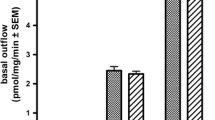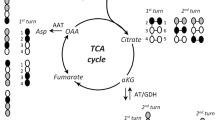Summary
-
1.
The effects of extracellular ACh and of atropine on the changes in 14C-ACh release and synthesis were examined in rat cerebral cortical slices using U-14C-glucose as the precursor of the ester's acetyl-moiety. The release and the synthesis of the labelled ester were measured in the presence of eserine during a 10 min period of depolarization (incubation) produced by 31 mM KCl, following a 60 min preincubation with 5.6 mM KCl.
-
2.
The rates of 14C-ACh synthesis and release were low when the ACh released in the course of the preincubation was still present during the 10 min incubation. They were in contrast much higher in two other experimental situations tested in which no extratissular ACh was present at the onset of incubation, i.e., when the preincubation was conducted in the absence of eserine or when the preincubation medium was discarded by filtration. The effect of the extracellular ACh on the 14C-ACh synthesis and release processes is mediated through a muscarinic receptor. Indeed, this inhibitory effect of external ACh could be reversed when atropine (10 μM) was present during the incubation period.
-
3.
The respective contributions, during the 10 min incubation, of the “newly synthesized” 14C-ACh-i.e. the labelled molecules formed during the incubation period-, and of the “stored” 14C-ACh-i.e. those molecules remaining in the tissues at the end of the preincubation-, to the release process evoked by 31 mM KCl were studied in two separate experiments, in which 14C-glucose was added only during the final incubation or only during the preincubation, respectively. It was found that only 40% of the KCl (31 mM) evoked release originated from the “newly synthesized” fraction, the rest deriving from the “stored” 14C-ACh. This proportion was not affected when atropine was present during the incubation period. It is concluded from these results that the “newly synthesized” ACh is not preferentially released under the experimental condition used, and that the inhibitory mechanism, triggered by the external ACh, on the rates of 14C-ACh synthesis and release, affects both the “newly synthesized” and the “stored” 14C-ACh.
-
4.
When similar experiments were carried out with 8 mM KCl, atropine (10 μM) stimulated solely the release of the 14C-ACh synthesized during the final 60 min incubation proceeding in the presence of the depolarizing agent. Indeed, atropine did not potentiate the 8 mM KCl-evoked release of “stored” 14C-ACh. Atropine (10 μM) significantly increased the release of 14C-ACh formed from 14C-glucose during a 60 min incubation made with a normal concentration of KCl (5.6 mM).
-
5.
These various results support the concept of an important role of presynaptic muscarinic receptors in the control of ACh synthesis and release in central cholinergic neurons.
Similar content being viewed by others
References
Bertels-Meeuws, M. M., Polak, R.L.: Influence of antimuscarinic substances on in vitro synthesis of acetylcholine by rat cerebral cortex. Br. J. Pharmacol. Chemother. 33, 368–380 (1968)
Birks, R. I., Fitch, S. J. G.: Storage and release of acetylcholine in a sympathetic ganglion. J. Physiol. (Lond.) 24, 125–134 (1974)
Bourdois, P. S., Szerb, J. C.: The absence of “surplus” acetylcholine formation in prisms prepared from rat cerebral cortex. J. Neurochem. 19, 1189–1193 (1972)
Bourdois, P. S., Mitchell, J. F., Somogyi, G. T., Szerb, J. C.: The output per stimulus of acetylcholine from cerebral cortical slices in the presence or absence of cholinersterase inhibitor. Br. J. Pharmacol. 52, 509–517 (1974)
Collier, B.: The preferential release of newly synthesized transmitter by a sympathetic ganglion. J. Physiol. 205, 341–352 (1969)
Fonnum, F.: Isolation of choline esters from aqueous solutions by extraction with tetraphenylboron in organic solvents. Biochem. J. 113, 291–298 (1969)
Guyenet, P., Lefresne, P., Rossier, J., Beaujouan, J. C., Glowinski, J.: Inhibition by hemicholinium-3 of 14C-acetylcholine synthesis and 3H-choline high affinity uptake in rat striatal synaptosomes. Molec. Pharmacol. 9, 630–639 (1973)
Lefresne, P., Guyenet, P., Glowinski, J.: Acetylcholine synthesis form (2-14C)pyruvate in rat striatal slices. J. Neurochem. 20, 1083–1097 (1973)
Lundholm, B., Sparf, B.: The effect of atropine on the turnover of acetylcholine in the mouse brain. Eur. J. Pharmacol. 32, 287–292 (1975)
Mann, P. J. G., Tennenbaum, M., Quastel, J. H.: CIII. Acetylcholine metabolism in the central nervous system. The effect of potassium and other cations on acetylcholine liberation. Biochem. J. 33, 822–835 (1939)
Molenaar, P. C., Polak, R. L.: Stimulation by atropine of acetylcholine release and synthesis in cortical slices from rat brain. Br. J. Pharmacol. 40, 406–417 (1970)
Polak, R. L.: Stimulating action of atropine on the release of acetylcholine by rat cerebral cortex in vitro. Br. J. Pharmacol. 41, 600–606 (1971)
Polak, R. L., Meeuws, M. M.: The influence of atropine on the release and uptake of acetylcholine by the isolated cerebral cortex of the rat. Biochem. Pharmacol. 15, 989–992 (1966)
Richardson, I. W., Szerb, J. C.: The release of labelled acetylcholine and choline from cerebral cortical slices stimulated electrically. Br. J. Pharmacol. 52, 499–507 (1974)
Snedecor, G. W., Cochran, W. G.: Statistical Methods. Ames: Iowa College Press (1967)
Szerb, J. C., Somogyi, G. I.: Depression of acetylcholine release from cerebral cortical slices by cholinesterase inhibition and by oxotremorine. Nature New Biol. 241, 121–122 (1973)
Author information
Authors and Affiliations
Rights and permissions
About this article
Cite this article
Rospars, J.P., Lefresne, P., Beaujouan, J.C. et al. Effect of external ACh and of atropine on 14C-ACh synthesis and release in rat cortical slices. Naunyn-Schmiedeberg's Arch. Pharmacol. 300, 153–161 (1977). https://doi.org/10.1007/BF00505046
Received:
Accepted:
Issue Date:
DOI: https://doi.org/10.1007/BF00505046




